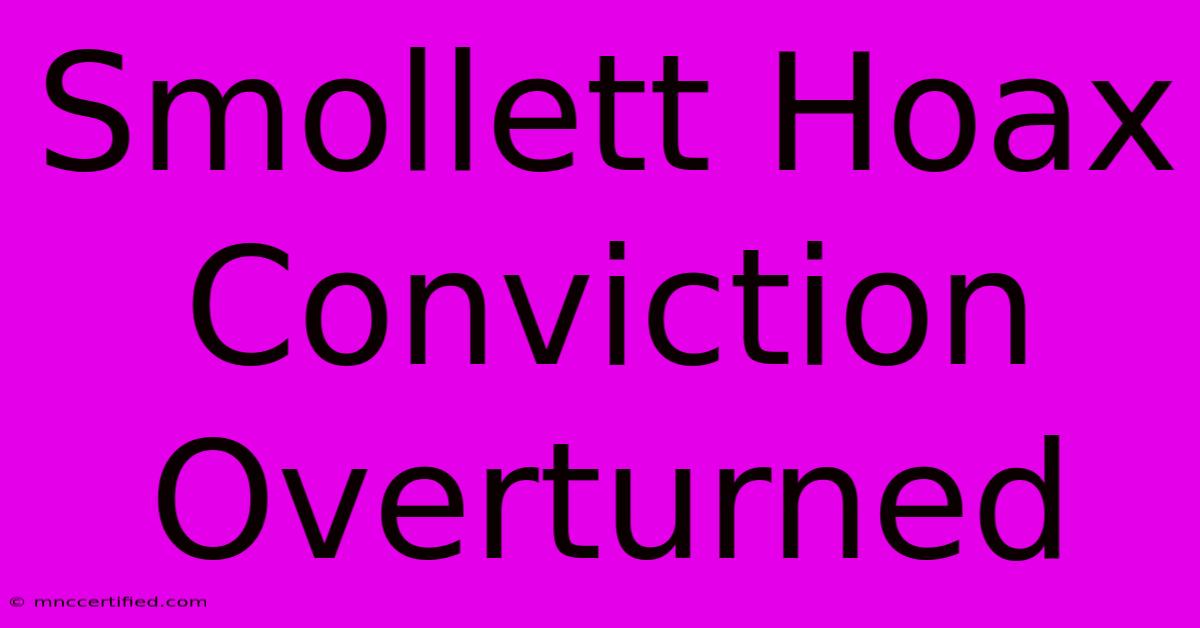Smollett Hoax Conviction Overturned

Table of Contents
Smollett Hoax Conviction Overturned: A Deeper Look at the Case
The conviction of Jussie Smollett for staging a hate crime hoax was overturned in March 2022, sparking renewed debate and scrutiny of the entire case. This decision, made by a judge in Cook County, Illinois, didn't declare Smollett innocent, but rather focused on procedural irregularities within the prosecution. This article delves into the details of the case, the reasons behind the overturned conviction, and the ongoing implications.
Understanding the Original Charges
In 2019, Jussie Smollett, then an actor on the television show Empire, reported to Chicago police that he had been the victim of a racist and homophobic attack. He claimed two men assaulted him, shouting racial and homophobic slurs, pouring bleach on him, and placing a noose around his neck. The incident quickly became national news, fueling outrage and igniting conversations about hate crimes in America.
However, the Chicago Police Department's subsequent investigation revealed a dramatically different story. They concluded that Smollett had orchestrated the entire event, paying two brothers, Abimbola and Olabinjo Osundairo, to stage the attack. He was subsequently charged with multiple felony counts of disorderly conduct, a charge related to filing a false police report.
The Trial and Conviction
Smollett maintained his innocence throughout the trial. However, the prosecution presented compelling evidence, including video footage, financial records, and testimony from the Osundairo brothers, which seemingly contradicted Smollett's account. A jury found him guilty on five of the six counts of disorderly conduct. He was sentenced to 150 days in jail, along with probation and fines.
The Overturning of the Conviction: Procedural Issues Take Center Stage
Judge James Linn, the same judge who oversaw the initial trial, overturned the conviction. His ruling centered not on the guilt or innocence of Smollett, but rather on procedural irregularities in the prosecution's handling of the case. Specifically, the judge cited the dismissal of the special prosecutor, Dan Webb, assigned to the case. Judge Linn argued that this dismissal created a conflict of interest, potentially undermining the fairness of the trial. He pointed to the fact that the prosecutor's office, having dismissed a large portion of the charges against Smollett at the beginning of the investigation, then decided to refile these charges after the initial charges had been dropped.
Key Arguments for the Overturning:
- Special Prosecutor's Dismissal: The abrupt dismissal of the special prosecutor was a central point in the judge's decision. He questioned the impartiality and legality of the subsequent proceedings.
- Procedural Irregularities: Judge Linn highlighted several procedural flaws during the prosecution, suggesting a lack of due process.
- Focus on Procedural Errors, Not Guilt: Importantly, the judge did not rule on Smollett's guilt or innocence. The decision was explicitly about the procedural issues that compromised the fairness of the initial trial.
The Ongoing Debate and Implications
The overturning of the conviction has reignited intense debate. Many criticize the judge's decision, arguing it sends the wrong message about the seriousness of filing false police reports, especially in cases involving hate crimes. Others maintain that procedural fairness should always prevail, regardless of the perceived guilt of the defendant. The case continues to highlight complex legal questions regarding due process, the role of special prosecutors, and the broader implications of high-profile cases involving accusations of hate crimes.
Search Engine Optimization (SEO) Keywords:
- Jussie Smollett
- Smollett hoax
- Smollett conviction overturned
- hate crime hoax
- Chicago hate crime
- false police report
- Dan Webb
- James Linn
- Cook County court
- procedural irregularities
- due process
- Empire actor
This article aims to comprehensively address the topic of Jussie Smollett's overturned conviction, incorporating relevant keywords for improved search engine optimization. The structure and content are designed to engage readers and provide a balanced perspective on a complex and controversial case. Remember to link to relevant news articles and legal documents when publishing this to enhance credibility and SEO.

Thank you for visiting our website wich cover about Smollett Hoax Conviction Overturned. We hope the information provided has been useful to you. Feel free to contact us if you have any questions or need further assistance. See you next time and dont miss to bookmark.
Featured Posts
-
Morehead Insurance Rockingham Nc
Nov 22, 2024
-
Storm Bert Brings Uk Travel Disruption
Nov 22, 2024
-
Rooneys Reaction To Waynes Escort Letter
Nov 22, 2024
-
Ground Beef Recalled Possible E Coli
Nov 22, 2024
-
Mls And Post Malone Whos Attending
Nov 22, 2024